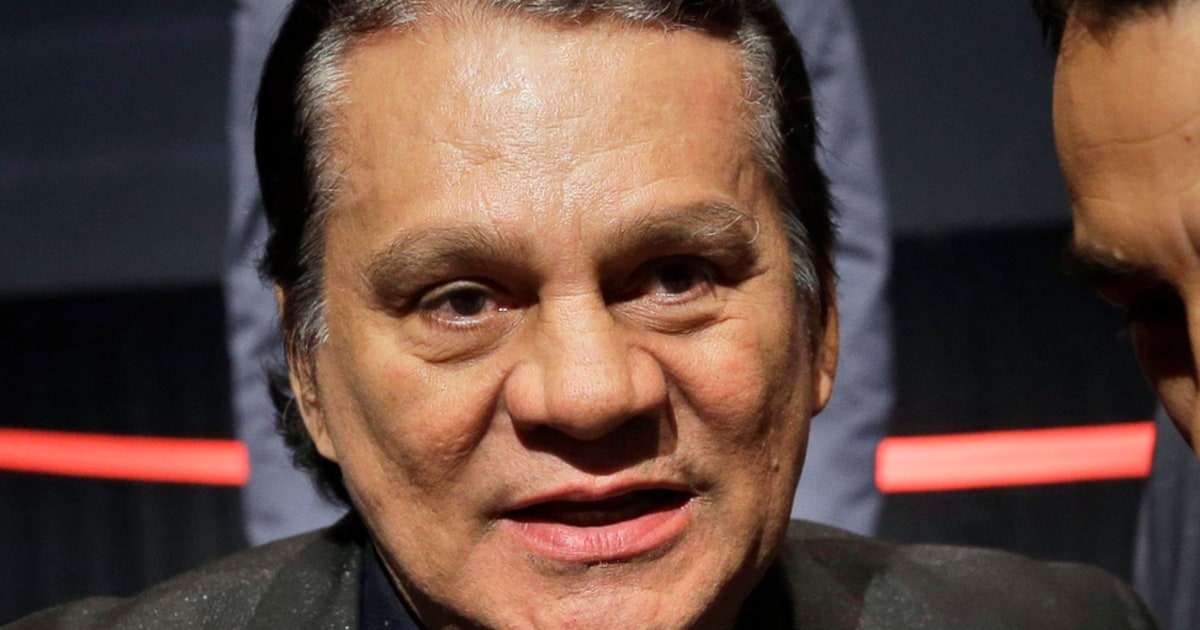Juan Pedro Franco Salas is a man marked by superlatives.
Reaching the maximum degree in any area, discipline or physical condition is the dream of many, who at some point, especially in childhood, wish to be the smartest, fastest, strongest person or have any other ability that leads them to surpass the mediocrity, the average of mortals.
For Franco, however, being exceptional has been a nightmare from his earliest childhood because of a rampant overweight that he could never control.
Having been the most obese man in the world is the shadow that hangs over his shoulders: in 2016, he entered the Guinness Book of Records for having reached 1,310 pounds (595 kilograms).
"That record is not my pride," says Franco, 36, "It is not an economic award, only recognition, but I still accepted it because that way you can reach more people.
You become better known and perhaps that way people will realize that being overweight is a big problem ”.
Juan Pedro Salas during a routine check-up with José Antonio Castañeda, his bariatric doctor, in December 2019. Gastric Bypass Mexico
Since May 2017, Franco has undergone a series of surgeries that have managed to lose him to nearly 440 pounds (200 kilos).
Born and raised in Aguascalientes, Mexico, his case is the extreme manifestation of a public health problem that has been considered an epidemic by Mexican authorities, which, in 2016, issued an alert due to high rates of diabetes and obesity.
[Sugar and processed foods prevail in quarantine and exacerbate the obesity and diabetes epidemic]
For years, Mexico has had the dubious honor of contesting the first places in obesity in the world: according to the 2018 National Health and Nutrition Survey, the percentage of the population over 20 years of age that suffers from obesity and overweight is 75% .
There are 8.6 million people who suffer from diabetes and 15.2 million who suffer from hypertension, diseases that in many cases are often associated with weight problems.
Mexico has 126 million inhabitants.
[Childhood obesity could be triggered by school closings]
"The epidemic of chronic diseases, induced by poor nutrition and an oversupply of unhealthy industrialized products," made Mexico more vulnerable to "an acute event" such as the coronavirus pandemic, said the Undersecretary of Health, Hugo López-Gatell, in May.
"With an infectious disease like COVID, [Mexico] has a very important burden that European nations do not have," he added.
24% of those who died in Mexico until September 3 suffered from obesity, according to health authorities (in total, 16,118 people).
Although the link between obesity and severe cases of COVID is still being studied, there is evidence that this condition can increase the severe complications caused by the pandemic.
A recent study carried out with more than 5,200 infected patients, and which included 35% of obese people, found that the chances of hospitalization increased for those with a high body mass index.
Juan Pedro Salas with his mother, María de Jesús Salas Lemus, in December 2020. Salas Lemus recently passed away from COVID-19 Gastric Bypass Mexico
"There is a trend towards hospitalization and intubation of people suffering from obesity, hypertension and diabetes, it seems that they develop serious forms of this disease", explains Daniel Pahua Díaz, academic of the Department of Public Health of the National Autonomous University of Mexico .
"In the case of obesity, the body is already stressed by an inflammatory process and that alters its functions, and this infection arrives that causes a cascade of inflammation as an unbalanced response of the body and complicates processes such as respiration", says Pahua, who is conducting a study on the incidence of comorbidities in complications related to COVID-19.
[These reasons explain why Latinos and blacks are the most exposed to dying from COVID-19]
For people like Franco, the coronavirus thus seems like a death sentence.
In many ways he is a survivor who speaks of his past as a war, a daily battle against being overweight, but nothing had prepared him for what he suffered last month.
“My mom got sick with COVID and passed away on September 1.
It gave me too, but the symptoms have been like flu and decay.
The coronavirus is not a lie, and chubby ones can kill us, "she says with a tired voice, while remembering that her father died three months ago of a fulminant heart attack because of the fear that she was infected with the disease.
"I watched the news and that made it worse," he explains, "he was locked up and he felt bad, but he didn't want to go to the doctor because of the fact that he said he could be infected.
And that's how he died ”.
The Mexican Undersecretary of Health, Hugo López Gatell, affirms that "67 million people are outside the public space"
April 17, 202003: 31
A boy who wanted to be normal
The excess has accompanied Franco since his birth 36 years ago in Aguascalientes.
With longing he says that at that time it was normal, he only weighed eight pounds (3 and a half kilos), and he remarks it in his conversations.
“I started to gain 10 kilos per year since I was born, and by the age of 6 I already weighed 70 kilos [155 pounds].
I was out of control, but they took me to doctors who said it was normal and it would go away when I grew up, "he recalls.
But it was not removed.
His mother, María de Jesús Salas Lemus, used to recall in detail her son's long pilgrimage through the Mexican medical system.
In the Social Security they measured and weighed it in the routine checkups but nothing else, they did not help her when she desperately asked them why her son was getting so fat and so fast.
"The pediatrician just told me: 'Ma'am, don't worry any more than when he grows up he takes it off on his own.'
That's what those irresponsible people told me, ”he explained almost sobbing last year.
On two occasions he was referred to the Centro Médico Nacional de Occidente, in Guadalajara, and he was also sent to León with Social Security.
In those places they subjected him to strict diets of cooked vegetables for a month, without fat, flour, or anything.
"But it didn't drop a gram," said his heartbroken mother.
The abuse was a constant in his life.
Teasing, hitting, and chasing were part of their daily routine.
Being the youngest of four children, three men and a woman, it was common for his brothers to fight with their schoolmates who said “there goes the pig”.
Despite all those difficulties that ended up truncating his aspirations and causing him to drop out of high school, he comments that he was a normal boy who liked to run, play with his friends, play sports, climb trees and jump everywhere.
Franco insists on normality.
What others would be bothered by this modern imperative that imposes exceptionality and difference, for him is his most important goal.
He explains that when he was very young, his father had to retire because he injured his back at work, so he had to start working at the age of 9 as an assistant in a grocery store.
But he never shrunk because of his problems, on the contrary, when he stopped studying he dedicated himself to various trades such as being a driver in the markets, passing through the courier until he was employed in a sewing workshop.
There he had to help with everything: from delivering pieces in heavy sacks to learning to sew.
[This disorder has a greater economic impact in Mexico than the theft of gasoline]
“I spent the whole day working, it's not how people think when I was sitting in front of a machine and that's why I got fat.
No. And at night I liked to go to the dances, I spent up to five hours dancing, "he says while his face lights up when he remembers that time," it was a very intense activity, I was also going to play soccer and there were two or more four hours of games because when you're young you don't feel tired.
And the next day, at 7 in the morning, I was going to work ”.
Francco is one of those people who can almost certainly identify the moment when his life turned upside down.
Until that moment, he struggled to be just another boy and, whenever he could, he displayed great physical activity.
Until "the accident" happened.
His face darkens when he remembers that trip to San Luis Potosí on an excursion from his work. "We ran out of brakes on a bus and I broke the entire right side," he says laconically, "I was only 17 years old, I was very young."
It was 3 in the morning in an area called Valley of the Ghosts when the crash happened.
Despite the blows, he never lost consciousness, the pain in his right femur was extremely intense and kept him awake until 7 in the morning when they could transfer him to a hospital.
“I arrived very badly, as if in shock from all the blood I had lost inside, because the femur was broken and it fell apart every time I moved.
At that time I was very weak and almost fainted but they wouldn't let me, ”she explains with a hint of sadness.
They put a plate with 12 screws in his leg and, although he was only hospitalized for 15 days in the medical center, he lasted a year and a half without being able to get out of bed.
It was the beginning of one of the periods of immobility that would become recurring in the years to come.
At the time he weighed 530 pounds (240 kilos), but climbed to 730 pounds (330 kilos) quickly.
To make matters worse, he contracted pneumonia that kept him in bed for about a year and a half on oxygen and, as he had no social security, he depended on the favors of well-known doctors.
A doctor who is a friend of his family prescribed medicine, but it was difficult to find resources for his recovery: "I felt discrimination in many aspects because nobody gave me a job and I couldn't help at home."
"People do not understand that when one passes the limit, a diet is no longer enough, with a very large obesity you can only lose a maximum of 30% of your weight, at the most and that not everyone does", he comments with dismay, " If you weigh 300 kilos, you will only lose 60 kilos and, even so, you will be very fat.
That is the difficult part ”.
Juan Pedro Salas with his parents, after receiving the Guinness Record for being the fattest man in the world, in 2016. Gastric Bypass Mexico
Dangerous limits
Juan did not stop gaining weight until he literally fell into a coma: his body expanded uncontrollably and he did not react to the treatments.
He was 27 years old and confined to a bed where he would not stop swelling because he was retaining a lot of fluid, until a time came when his skin began to break open with blisters that spilled water everywhere.
He was approaching 1,300 pounds (600 kilos) at the time.
"I would take the marriage sheets and fold them to put them where there were holes and they were soaked in clean water that did not stink, it had no fat, but it dripped everywhere," explained his mother, "a doctor who was treating him in the coma, he injected him and ordered him to take many diuretics to get the water out quickly and it worked because his ampules closed ”.
At that time it took between five and seven people to move him, and they put a metal frame near his bed so that he too would help a little.
His skin was sagging and his lungs were crushed under the weight, his heart had risen to near his shoulder from being overweight.
"I came to feel that even breathing made me fat," he laments.
In 2016, she met José Antonio Castañeda Cruz, a bariatric surgeon who was interested in her case.
Franco suffered from diabetes, hypertension, respiratory problems, and various conditions with a guarded prognosis.
“It was impressive, but we were not afraid.
On the contrary, we wanted to help him live and, after the operations, he lost more than 50% of his excess weight, "explains Castañeda from his office in Guadalajara," but the interesting thing is that he is under control of his diabetes, hypertension and all diseases He
is
a healthy person and proof of this is that he was infected with COVID and it has not affected him.
Castañeda also caught COVID-19, and that kept him from his practice for more than a month.
For him, the relationship between being overweight and the most serious manifestations of the pandemic is clear.
Now he usually cares for obese patients who come to his office saying "I don't want to be next, I don't want to die."
In the 15 years he has dedicated to this type of surgery, he has never seen so much interest and concern.
“Most of the patients who were in intensive care, at least in Mexico, were overweight, obese and some comorbid disease, especially diabetes and hypertension.
This is a clear wake-up call because the way we eat and exercise has to change ”, he asserts.
Before the pandemic, Juan's life had a clear course: to undergo surgery to remove excess skin, calculated at about 150 pounds (70 kilos), which would place him at a weight of about 275 pounds (125 kilos).
One step closer to normality that you crave so much.
But he will have to wait because, in addition to taking away his parents and ending his small fruit and vegetable business, COVID-19 has also made surgical interventions difficult throughout the country due to the medical emergency.
“In Mexico we have to understand that obesity is a very serious problem, and it can kill us.
Right now many are afraid of the pandemic, but later they forget.
No. We must stop eating poorly, exercising and changing our lives.
That's what mom wanted me to achieve, and I'm going to continue fighting for that, ”concludes Franco while still waiting for his future.








/cloudfront-eu-central-1.images.arcpublishing.com/prisa/HXJJWNKRZ5D5NKZOZI3RD7WCMY.jpg)